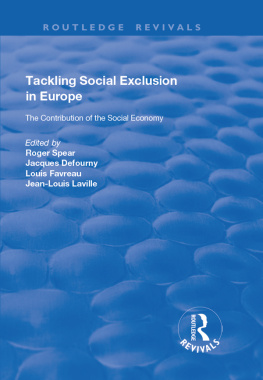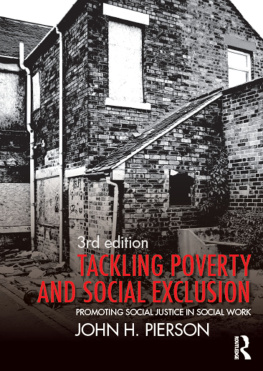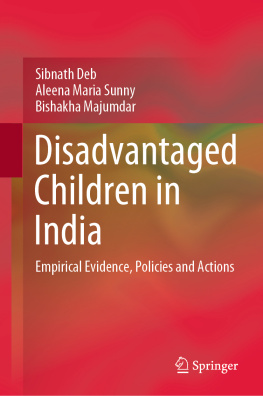Sara Miller McCune founded SAGE Publishing in 1965 to support the dissemination of usable knowledge and educate a global community. SAGE publishes more than 1000 journals and over 800 new books each year, spanning a wide range of subject areas. Our growing selection of library products includes archives, data, case studies and video. SAGE remains majority owned by our founder and after her lifetime will become owned by a charitable trust that secures the companys continued independence.
Los Angeles | London | New Delhi | Singapore | Washington DC | Melbourne

Jonathan Parker and Sara Ashencaen Crabtree 2018
First published 2018
Apart from any fair dealing for the purposes of research or private study, or criticism or review, as permitted under the Copyright, Designs and Patents Act 1988, this publication may be reproduced, stored or transmitted in any form, or by any means, only with the prior permission in writing of the publishers, or in the case of reprographic reproduction, in accordance with the terms of licences issued by the Copyright Licensing Agency. Enquiries concerning reproduction outside those terms should be sent to the publishers.
Library of Congress Control Number: 2017954828
British Library Cataloguing in Publication Data
A catalogue record for this book is available from the British Library
ISBN 978-1-4739-9457-7
ISBN 978-1-4739-9458-4 (pbk)
Learning Matters
An imprint of SAGE Publications Ltd
1 Olivers Yard
55 City Road
London EC1Y 1SP
SAGE Publications Inc.
2455 Teller Road
Thousand Oaks, California 91320
SAGE Publications India Pvt Ltd
B 1/I 1 Mohan Cooperative Industrial Area
Mathura Road
New Delhi 110 044
SAGE Publications Asia-Pacific Pte Ltd
3 Church Street
#10-04 Samsung Hub
Singapore 049483
Editor: Kate Keers
Production controller: Chris Marke
Project management: Swales & Willis Ltd, Exeter, Devon
Marketing manager: Camille Richmond
Cover design: Wendy Scott
Typeset by: C&M Digitals (P) Ltd, Chennai, India
Printed in the UK
At SAGE we take sustainability seriously. Most of our products are printed in the UK using FSC papers and boards. When we print overseas we ensure sustainable papers are used as measured by the PREPS grading system. We undertake an annual audit to monitor our sustainability.
We would like to dedicate this book to our children, Isabel and Miranda, and to all the service users, clients and families we worked with when we too were once social workers. And as the pseudo-Latin phrase goes: illegitimi non carborundum!
Series editors preface
We have witnessed significant changes and shocks in recent years. These have resulted in numerous challenges for the wider world, and for all four countries of the UK (England, Northern Ireland, Scotland and Wales). These include political shifts to the popular Right, a growing antipathy to care and support and dealing with lies and alternative truths in our daily lives. Alongside this is the need to address the impact of an increasingly ageing population with its attendant social care needs and working with the financial implications that such a changing demography brings. At the other end of the lifespan the need for high-quality childcare, welfare and safeguarding services has been highlighted as society develops and responds to the changing complexion. As demand rises, so do the costs and the unquestioned assumption that austerity measures are necessary continues to create tensions in services, policies and expectations.
Migration has developed as a global phenomenon and we now live and work with the implications of international issues in our everyday and local lives. Often these issues influence how we construct our social services and determine what services we need to offer. It is likely that as a social worker you will work with a diverse range of people throughout your career, many of whom have experienced significant, even traumatic, events that require a professional and caring response. As well as working with individuals, however, you may be required to respond to the needs of a particular community disadvantaged by world events or excluded within local communities because of assumptions made about them.
The importance of high-quality social work education remains if we are to address adequately the complexities of modern life. We should continually strive for excellence in education as this allows us to focus clearly on what knowledge it is useful to engage with when learning to be a social worker. Questioning everything, especially from a position of knowledge, is central to social work.
The books in this series respond to the agendas driven by changes brought about by professional bodies, governments and disciplinary reviews. They aim to build on and offer introductory texts based on up-to-date knowledge and to help communicate this in an accessible way, so preparing the ground for future study and for encouraging good practice as you develop your social work career. The books are written by people passionate about social work and social services and aim to instil that passion in others. The current text introduces core social work themes that all practitioners will face. Working with marginalisation and disadvantage is something that is core to the profession.
Professor Jonathan Parker
Acknowledgements
We are most grateful to our students, colleagues and service users and carers we have worked with for the time and passion spent discussing ideas and thoughts that in some sense have made their way into this book. In this regard we would like to thank Susi, Terry and Muriel in particular. We hope we have done justice to everyone in this process. We would also like to acknowledge the great support provided by Kate Keers at SAGE who has been fundamental in kick-starting the project and encouraging its completion.
Introduction
In this introduction we will introduce you to the rationale underlying the book, setting the scene for understanding contemporary social work by offering a brief history of its growth and expansion and drawing on the development of ethical and value statements for practice over time. Whilst acknowledging the many forms of social work and its multiple foci, the book will emphasise the political and personal aspects of social work in practising with people at the edges of or excluded from society. The focus for understanding will primarily be on English social work but the discussion of concepts, discourses and practices transfers across countries and administrations. We will, therefore, use examples from international social work that illustrate core themes, thinking and practices without losing sight of organisational, contextual and practice differences across countries. Subsequently, at the end of this introduction, we provide an overview of the coverage of the book, introducing each part and chapter.
A rationale for the book
There are a range of texts that deal with issues of marginalisation and disadvantage (Burke and Parker, 2007; Sheppard, 2012; Matthies and Uggerhj, 2014; Al Krenawi et al., 2016), anti-discriminatory and anti-oppressive practice (Dominelli, 2002, 2008; Dalrymple and Burke, 2006; Laird, 2008; Bhatti-Sinclair, 2011; Bartoli, 2013; Thompson, 2016; Williams and Graham, 2016) and social justice and human rights (Ferguson, 2008; Lundy, 2011; Dominelli, 2012; Austin, 2014). So it is important to ask why we need a book that deals with such seemingly central issues to social work practice. First of all we need a word or two about the title of the book. When proposing this title we wanted to consider all people, individuals and groups, who are in some way marginalised from or out of step with their wider society. However, the phraseology highlights a number of questions that we need to address. For instance, who or what marginalises whom? how does that take place? is it always negative? and, do people who are marginalised necessarily experience disadvantage? The direction of actions leading to marginalisation is also central to understanding what it is we are trying to address. Some of these debates are fluid and set in history and so will change over time. Some are more rooted within philosophical, political and ethical structures through which social work carefully treads.

















